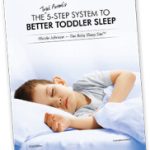
If your baby is very fussy at 3 months old, you might dread the days. You are likely tired and frustrated trying to make your baby happy all day. If this describes you, this is common and there are three primary reasons this occurs. This post will share these 3 reasons and give you 3 tips to get through this frustrating stage based on 10+ years of experience as a sleep consultant.
Baby Very Fussy at 3 Months From a Growth Spurt
Growth spurts are common throughout the first year. They tend to occur around 7-10 days old, 2 weeks, 4 weeks, 8 weeks, 12 weeks (or 3 months), 4 months, 6 months, 8 1/2 months, 10 1/2 months, and 12 1/2 months old. Of course, every baby grows and develops on their unique timeline so you can’t expect them to start and end at the exact age but these are the average ages.
During a growth spurt, your baby is likely to be fussy for one major reason: hunger! Babies going through growth spurts typically get hungry very often to the point you feel like you are feeding them all day and night!
Babies going through a growth spurt also sleep a lot. They tend to get tired very quickly, take longer naps, and go to bed earlier.
Growth spurts last around 3-4 days to a week and once they are over, your baby’s fussiness should lessen.
You May Also Be Interested In…
Sleep Regression and Developmental Leap
If your baby is very fussy at 3 months old and it comes on suddenly, they could also be going through a developmental leap. At 3 months old, many babies are becoming smoother with their physical movements and become more active. They might start rolling in one direction, from back to front, or from front to back. These developmental milestones can make your baby fussy.
In addition, this is a common age for babies to start breaking out of the swaddle. It’s a common time to stop swaddling.
During many developmental milestones, babies go through a sleep regression. During a sleep regression, your baby is likely waking frequently at night and taking short naps. The sleep regression around this time is the 4-month sleep regression. Some babies start this regression at 3 months old and the 4-month sleep regression lasts 3 to 4 weeks at its peak.
You May Also Be Interested In…
Illness Leads to Very Fussy Babies at 3 Months
When you have a newborn, you typically keep visitors to a minimum to make sure no one unknowingly gives your baby a cold. However, eventually, you want more visitors and to get out of the house. So, a common reason for babies to be very fussy at 3 months is due to illness. It’s typically a cold though almost all children get RSV at least once in their first two years. My son got RSV within the first 3 months of his life, too.
In addition to viruses, if your baby is very fussy, you might consider if they have GERD or Infant Reflux. Taking a trip to the doctor is in order as this is a commonly diagnosed condition. And, if your baby is on reflux medication, we have found that sometimes the dosage needs to be adjusted around this age. Babies grow very fast these first few months! While at the doctor, have your baby checked for ear infections too, as these are common in the first months and years as well!
Also, if your baby has experienced colic, this is a common age for it to end. However, some babies don’t stop until closer to 4 months old.
What about teething?
Generally, teething doesn’t start until after 5 months old even if your baby is drooling. This is NOT as likely causing your baby’s fussiness.
You May Also Be Interested In…
3 Tips to Get Through This Fussy Period
Assuming you’ve ruled out any health issues with your baby’s doctor, there are ways to get through this frustrating stage with your 3-month-old:
Feed Your Baby
This might seem like a no-brainer but we see some parents who are very rigid with their baby’s schedule. For example, those following 12 Hours by 12 Weeks will feed their baby only every 4 hours. During a growth spurt, though, that can lead to very long days of fussiness! In addition, in some cases, sometimes you will get short naps if your baby’s next meal is landing during the middle of a nap.
Consider increasing the size of your baby’s feedings in addition to feeding more often during a growth spurt. Or, it could be time to start solid foods with your doctor’s permission. Some doctors will add solid foods earlier if the baby has a big appetite. Generally, we try to wait until 6 months old so it depends on the baby.
Shorten Wake Windows
When your baby is growing and developing rapidly, they might get tired more quickly than they did a few weeks ago. Consider shortening the wake windows before naps and bedtime. The proper 3-month old schedule can do wonders for a fussy baby!
Wear Your Baby and Go for Walks
When babies are going through developmental leaps and/or illnesses, they often feel a bit more apprehensive about the world around them. They want to be close to you and sometimes distracted. Going for a walk with your baby in a carrier can be a great way to give them both!
Whether your baby is 3 months, 6 months, or 10 months old, they are going through a lot this first year. Hang in there and know that these stages pass quickly. As the saying goes, the days are long but the years are short.






